10-minute read
keywords: neurobiology, philosophy
Do we have free will or not? Despite millennia of debate, this question stands as one of those seemingly unresolvable conundrums. I admit it has never kept me up at night; yes, biology influences and constrains our behaviour, but it sure feels like we have free will. Beyond that, however, I confess to ignorance on this subject. With the caveat that I do not expect one or even two books to definitively settle this matter, I was very excited by the simultaneous publication last October of Determined: Life Without Free Will and Free Agents: How Evolution Gave Us Free Will. Well, guess I have no choice on this particular occasion: this pair just cries out for a double review.
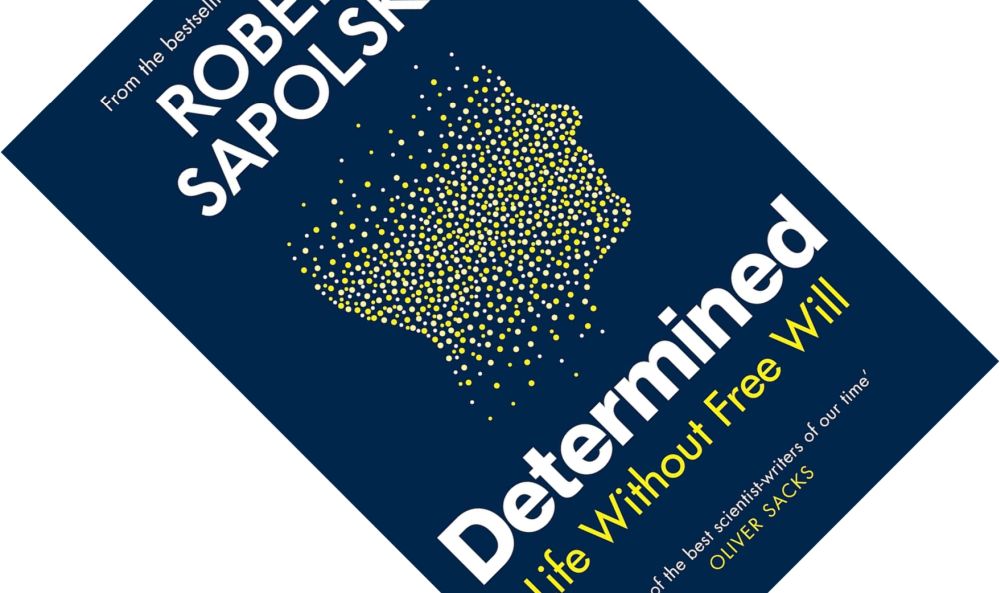
Determined: Life Without Free Will, written by Robert M. Sapolsky, published in Europe by The Bodley Head in October 2023 (hardback, 528 pages)
Robert M. Sapolsky is a professor of biology and neurology who you may remember from his 2017 best-seller Behave, a 790-page behemoth on the biology of human behaviour. Before delving in, let me immediately highlight that Determined is accessible, well-researched, witty, and irreverent; it regularly made me chuckle. For a book that could have gotten bogged down in philosophical and neurobiological jargon, this one is a joy to read.
Clearly, Sapolsky does not believe in free will. But what does that mean? He falls in the minority camp of hard incompatibilism: the world is deterministic (i.e. events result from both prior events and the laws of nature), this is incompatible with free will, and we are thus not morally responsible for our actions. He feels allied to e.g. Derk Pereboom and especially Sam Harris. The majority view he will examine and criticize most often is that of compatibilism: the world is deterministic, this is nevertheless compatible with free will, and we are morally responsible. Daniel Dennett is a well-known proponent and someone Sapolsky strongly disagrees with. Other views only feature marginally here. Given Sapolsky’s strong position, we are obviously not on neutral ground, so readers interested in seeing these various views debated might want to check out e.g. Four Views on Free Will, Just Deserts, or the recent Free Will. Also important: how does he define free will? He takes a neurobiological perspective. To demonstrate free will, “show me a neuron (or brain) whose generation of a behavior is independent of the sum of its biological past” (p. 15). If I understand him correctly, he is in effect demanding you demonstrate a causeless cause. Whether this is a fruitful approach is debatable, but he defends it as: “anything but an absurdly high bar or straw man” (p. 84).
Positional sketch out of the way, Determined breaks down into three parts that I will discuss in turn before giving some overall thoughts.
“[Sapolsky argues] we do not have free will because our actions resulted from prior causes […] it is turtles all the way down: a seamless chain of causality stretching back in time.”
First is Sapolsky’s view. We do not have free will because our actions resulted from prior causes, which themselves resulted from prior causes, which… etc. He walks you through this causal chain of events that goes back seconds (behaviour was caused by neurons firing), minutes (which was caused by a thought, memory, emotion, or sensory stimulus), hours to days (hormones), months (long-term experiences, e.g. depression), years and decades (e.g. childhood, genetics), and centuries (the culture of your ancestors). Cognoscenti might ask: “What about Benjamin Libet’s work?” He argued that brain activity precedes conscious awareness of actions. Sapolsky covers this in the first chapter but thinks it irrelevant: focusing on the microseconds before an action neglects everything that came before. His central point is that “we are nothing more or less than the cumulative biological and environmental luck, over which we had no control” (p. 4). Or, to employ one of his favourite metaphors, it is turtles all the way down: a seamless chain of causality stretching back in time “without a crevice for free will to lodge in” (p. 123).
Unassailable logical elegance or circular reasoning? I cannot quite decide what to make of his argument, but I see two problems with it. First, Sapolsky admits that each of these prior causes individually does not refute free will. Many of them do little more than influence or constrain the likelihood of certain behaviours. At best the available data shows we have less free will than we thought. But that is not what the book argues. Despite a few apologetic admissions that his is a fringe position and he will “settle for merely significantly challenging someone’s free-will faith” (p. 242), he nevertheless makes the giant leap that it all adds up to completely rule out free will. Would hard rejection not require that you demonstrate complete predictability at each level? Second, I think his turtle metaphor is not quite accurate. We are not standing on a tower of turtles; we are standing on a mountain of turtles. It is not a linear chain, but a ramifying, branching network. The further back in time you go, the more factors you can invoke and the less influential each becomes. Though a footnote on page 83 concedes the latter point, he ignores the former.
“The third part of the book is more of a thought experiment: what would happen if we all stopped believing in free will? These chapters are a mixed bag.”
Moving on, the second part of Determined focuses on three scientific revolutions that potentially break the idea of determinism, the familiar chain of cause and effect. Many people argue that chaos theory, emergent complexity, or quantum mechanics could give rise to free will. Sapolsky admits he is less emotionally invested in this section and he evidently had fun writing it. In six short chapters, he gives an accessible primer to each and explains why he thinks they do not generate free will. The first two confuse systems behaving unpredictably with them being indeterministic: just because you cannot deduce prior causes does not mean there were none. According to the third, the world is indeterministic on a subatomic level, but there is no evidence that this “bubbles up” to higher levels. And if it did, behaviour would be random. Tackling quantum mechanics might seem ambitious and he admits that “I really do not want to write this chapter” (p. 203). Fortunately, he was advised by physicist Sean Carroll, whose humble and careful views I trust. I actually mostly agree with Sapolsky on all three, though I remain intrigued by emergent complexity. A potential red flag is that he admits he does not always understand what its advocates are claiming. Something to put a pin in for the future.
The third part of the book is more of a thought experiment: what would happen if we all stopped believing in free will? These chapters are a mixed bag. How could we change our behaviour? Simple, Sapolsky explores the neurobiological basis of learning, showing no free will is needed. Fine. We have changed our minds before. We no longer blame people afflicted by epilepsy and schizophrenia but understand these to be biological phenomena. If we achieved that, we can change our minds on free will. Sure. Other chapters are less convincing though. Would we become immoral? No, supporting evidence from behavioural experiments is weak. He draws parallels to the peculiar American concern regarding atheism. Look at the low crime rates in Scandinavia! If rejecting faith does not foster immorality, rejecting free will won’t either. Confounding factors aside, I am not sure of the logic. I rather see parallels between rejecting faith and embracing free will (if you stop believing god is looking out for you, you will have to look out for you) or embracing faith and rejecting free will (both could lead you to believe you are not in charge). Next! What do we do with criminals? This chapter is a mess. Rather than punishing people by locking them up, Sapolsky proposes something akin to medical quarantine where we restrict the freedom of dangerous individuals to protect society. Congratulations, you have just described the prison system in different words. In my experience living in the Netherlands and the UK, the risk of recidivism regularly factors into sentences handed out by judges. Worse, punishment has evolved in other social species as an effective strategy to dealing with miscreants, and it feels neurobiologically good, firing up reward circuits in our brains. He admits this is “the tip of the iceberg of a gigantic problem” (p. 355) against his case. Last one: he is haunted by the very real concern that rejecting free will robs people of a sense of purpose and meaning in life. No wonder e.g. Dennett has called instilling this belief in people dangerous and irresponsible.
“Though he succeeds in his soft goal of arguing that our free will is limited, I am not convinced the available data supports his hard rejection, merely the perhaps unsatisfying conclusion that the status of free will remains undetermined.”
This brings me to some general observations; the good, the bad, and the incongruous. Starting with that last one, Sapolsky is remarkably torn over his own beliefs. Clearly, he thinks that he should believe there is no free will, but he admits that “I usually fail dismally [and] even I think it’s crazy to take seriously all the implications of there being no free will” (p. 9). On to the good. Determined is nothing if not intensely thought-provoking and did make me question myself. Could it all be an illusion? After all, we are easily fooled and our brain is a hyperactive agency detector. However, (here comes the “bad”) if that is true I apologise to Sapolsky: it is just too strong an illusion and this book has not robbed me of it. Though he succeeds in his soft goal of arguing that our free will is limited, I am not convinced the available data supports his hard rejection, merely the perhaps unsatisfying conclusion that the status of free will remains undetermined.
This state of play does throw up several intriguing questions that I feel Sapolsky skirts. First, given the above risks of rejecting free will, what is the more prudent thing to do? Should we assume free will until proven otherwise, or vice versa? My impression is that different groups are now pointing fingers at each other: “No, you have the burden of proof!” Second, if free will does not exist, why have we and other primates evolved to believe in it? A footnote on page 229 refers to work by John Searle addressing this, and the last chapter touches on it, but he never confronts this question head-on. Finally, I highlighted that each step in his causal chain of events has limited explanatory power. Does this mean that we just need more data? Can we ever reach a point where our behaviour is fully predictable? (Sapolsky replies: “Never—that’s one of the points of chaoticism” (p. 243)). Or do we conclude that, just because we cannot explain it, this does not mean it is not there? Though this book is intellectually rewarding, I feel we have reached an impasse. Walter Veit recently tackled the problem of consciousness in a very rewarding fashion by asking how it could have evolved in small steps. High time, thus, to turn to Free Agents to see whether an evolutionary lens can shed further light on this thorny question. (Spoiler alert: Mitchell’s book in my opinion profoundly deflates Sapolsky’s line of argumentation.)
Disclosure: The publisher provided a review copy of this book. The opinion expressed here is my own, however.
Other recommended books mentioned in this review:
__________________________________________________________________
__________________________________________________________________
__________________________________________________________________
__________________________________________________________________


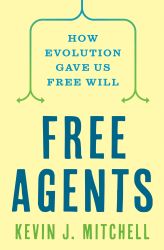
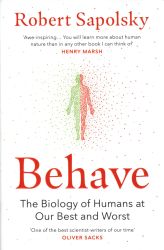
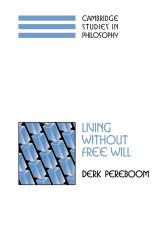
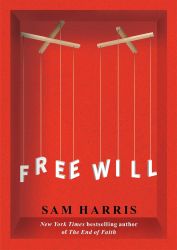
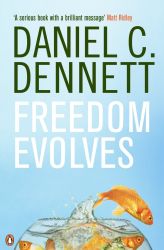

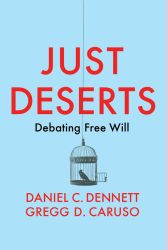
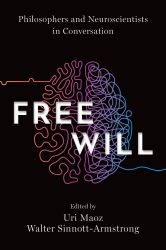
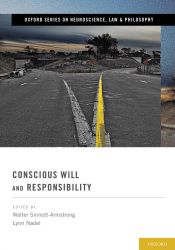
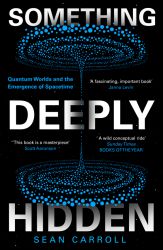
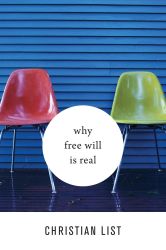
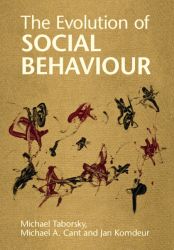
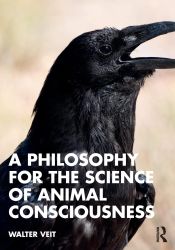
I´m in the minority camp too. Emergence boils down to magic, as if it somehow would escape causality. Predictability doesn´t say anything about downward causality, so it´s not really relevant.
What muddles the debate is that some are ´more´ determined than others: e.g. a drug addict has additional causal constrains to his behavior. The same goes for prisoners, the poor, etc.
The other thing is the fact that we do make choices whole the time. The question boils down to whether we could have made a different choice in the exact same circumstances.
Of interest too: https://www.pnas.org/doi/10.1073/pnas.0915161107
LikeLiked by 2 people
Thanks for the link. Definitely a topic that stirs debate. My impression (that is admittedly not grounded in much having so far read just one book on it) is that a lot of confusion and disagreement stems from a lack of agreed-upon definitions, meaning debates circle around endlessly.
I have almost finished Free Agents which to me presents a far more compelling argument. I will need a moment to gather my thoughts on that as it’s is some pretty heady stuff that I found very insightful.
LikeLiked by 1 person
Yes, a big part of the problems in these matters are semantic issues. Looking forward to that next review!
LikeLiked by 1 person
I really enjoyed your review! Thanks for putting into words what I felt was missing from a fun read.
— an aspiring economist curious about causality and counterfactual behavior
LikeLiked by 1 person